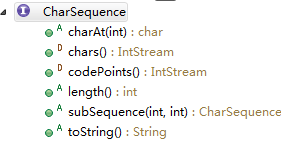【jdk1.8】String源码分析
String
类的声明
public final class String
implements java.io.Serializable, Comparable<String>, CharSequence首先可以看到String类是一个不变类,被final修饰,所以是不可继承的。
它实现了Serializable接口,还有Comparable(主要就是compareTo方法)与CharSequence(如下图)。

类的成员变量
/** 底层字符的存储*/
private final char value[];
/** 哈希码*/
private int hash; // Default to 0类的构造方法
主要有三类类的构造方法,第一种是和byte[]相关的,第二种是和char[]相关的,第三种是和StringBuilder和StringBuffer相关的。
byte[]类
byte[]类里比较重要或者说比较常用的一个方法就是解码了。
public String(byte bytes[], String charsetName)
throws UnsupportedEncodingException {
this(bytes, 0, bytes.length, charsetName);
}
public String(byte bytes[], int offset, int length, String charsetName)
throws UnsupportedEncodingException {
if (charsetName == null)
throw new NullPointerException("charsetName");
checkBounds(bytes, offset, length);
this.value = StringCoding.decode(charsetName, bytes, offset, length);
}我们来看一个例子:
String test = "中文";
String[] csn = new String[] {"ISO-8859-1", "GBK", "UTF-8"};
for(int i=0;ibyte[] bt = test.getBytes(csn[i]);
for(int j=0;jnew String(bt, csn[j]);
String res = new String(str.getBytes(csn[j]), csn[i]);
System.out.print(res+"\t");
}
System.out.println();
} 结果是:
ISO GBK UTF-8
ISO ?? ?? ??
GBK 中文 中文 锟斤拷锟斤拷
UTF-8 中文 中文 中文为什么ISO-8859-1那一行编码组合再还原都不行呢?
因为ISO-8859-1编码的编码表中,没有包含汉字字符,当然也就无法通过["中文".getBytes("ISO8859-1");]来得到正确的”中文”在ISO-8859-1中的编码值了,所以再通过new String()来还原就无从谈起了。
char[] 和 StringXxx
主要就是Arrays.copyOf()的应用咯。
类的关键方法
hashCode()
public int hashCode() {
int h = hash;
if (h == 0 && value.length > 0) {
char val[] = value;
for (int i = 0; i < value.length; i++) {
h = 31 * h + val[i];
}
hash = h;
}
return h;
}其实就是公式s[0]*31^(n-1) + s[1]*31^(n-2) + ... + s[n-1]的值。
intern()
/**本地方法*/ /**
* Returns a canonical representation for the string object.
*
* A pool of strings, initially empty, is maintained privately by the
* class {@code String}.
*
* When the intern method is invoked, if the pool already contains a
* string equal to this {@code String} object as determined by
* the {@link #equals(Object)} method, then the string from the pool is
* returned. Otherwise, this {@code String} object is added to the
* pool and a reference to this {@code String} object is returned.
*
* It follows that for any two strings {@code s} and {@code t},
* {@code s.intern() == t.intern()} is {@code true}
* if and only if {@code s.equals(t)} is {@code true}.
*
* All literal strings and string-valued constant expressions are
* interned. String literals are defined in section 3.10.5 of the
* The Java™ Language Specification.
*
* @return a string that has the same contents as this string, but is
* guaranteed to be from a pool of unique strings.
*/
public native String intern();